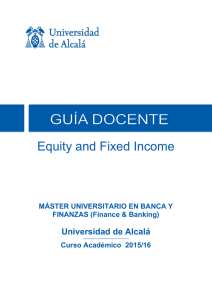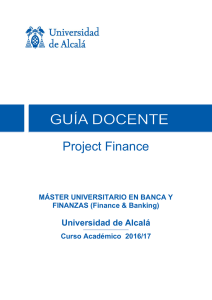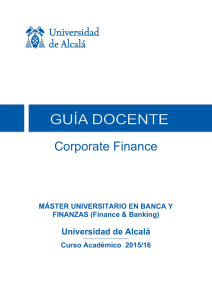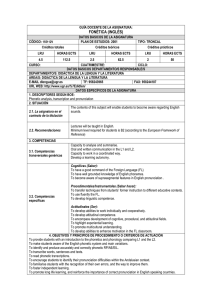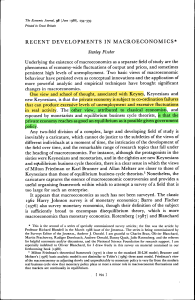Basics in Macroeconomics
Anuncio
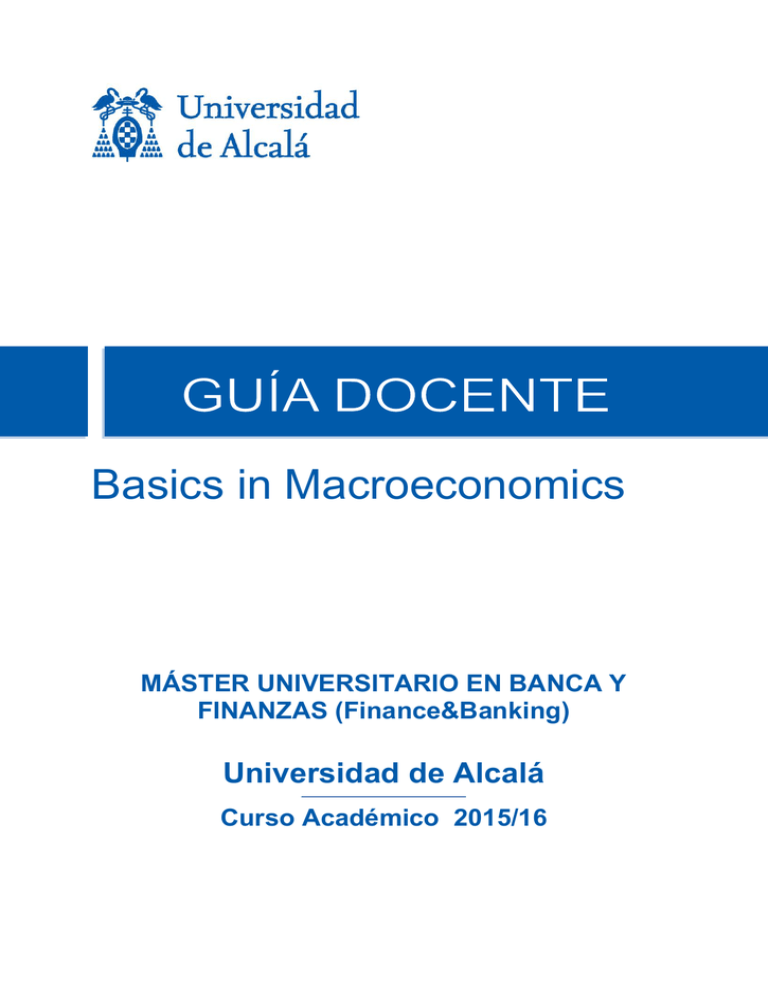
Basics in Macroeconomics MÁSTER UNIVERSITARIO EN BANCA Y FINANZAS (Finance&Banking) Universidad de Alcalá Curso Académico 2015/16 GUÍA DOCENTE Nombre de la asignatura: Código: Basics in Macroeconomics 201551 Titulación en la que se imparte: MÁSTER UNIVERSITARIO EN BANCA Y FINANZAS (Finance&Banking) Departamento y Área de Conocimiento: Economía Carácter: Créditos ECTS: Presencial 2 Curso y cuatrimestre: 1º Profesorado: Dr. Gonzalo Rodríguez Prada Profesor Titular UAH Horario de Tutoría: 16.30 – 17:30 h. Idioma en el que se imparte: Inglés 1. PRESENTACIÓN This course provides an overview of main macroeconomics issues related to the Master curriculum. Prerrequisitos y Recomendaciones (si es pertinente) 2. COMPETENCIAS Competencias genéricas: 1. To understand basic economic and financial concepts. Competencias específicas: 1. To analyze how markets work. To differentiate between real and nominal variables. 2. To examine a market economy in the short term and in the long run. 3. To understand the macroeconomics of the open economies. 4. To discuss today’s key economic policy debates in the E.U. and the world economy. 3. CONTENIDOS Total de clases, créditos u horas Bloques de contenido (se pueden especificar los temas si se considera necesario) REAL AND MONETARY ECONOMICS: THE LONG RUN 2h REAL AND MONETARY ECONOMICS: THE SHORT RUN 2h MACROECONONOMIC POLICY, INFLATION AND UNEMPLOYMENT 2h THE EFFECTIVENESS OF FISCAL AND MONETARY POLICIES 2h Cronograma (Optativo) Semana / Sesión Contenido REAL AND MONETARY ECONOMICS: THE LONG RUN The data of macroeconomics. Chapter 2. 01ª The economy in the long run. Chapters 3, 4, 5, 7. REAL AND MONETARY ECONOMICS: THE SHORT RUN Aggregate supply and unemployment. Chapters 10 and 14. 02ª Aggregate demand: the goods market and the money market. Chapters 11 and 12. Macroeconomics of open economies. Chapters 6, 13. MACROECONONOMIC POLICY, INFLATION AND UNEMPLOYMENT 03ª The short-run trade-off between inflation and unemployment. Chapter 14. A dynamic model of aggregate supply and demand. Chapter 15. Monetary policy rules. Chapters 15, 18. 04ª THE EFFECTIVENESS OF FISCAL AND MONETARY POLICIES Managing a liquidity trap: monetary and fiscal policy. PowerPoint presentation. Macroeconomic policy in an uncertain world. Chapters 15, 18. 4. METODOLOGÍAS DE ENSEÑANZA-APRENDIZAJE.-ACTIVIDADES FORMATIVAS 4.1. Distribución de créditos(especificar en horas) Número de horas presenciales: 8 Número de horas del trabajo propio del estudiante: 12 Total horas 20 4.2. Estrategias metodológicas, materiales y recursos didácticos Shared analysis and discussion of the main topics. Participants should read in advance the relevant chapters and references. Exposition in class will be mainly verbal and diagrammatic, with some use of maths where appropriate. There will be a strong emphasis on students securing an intuitive understanding of the models being analyzed. 5. EVALUACIÓN: Procedimientos, criterios de evaluación y de calificación1 The overall course grade will be computed as follows: 1. Attendance: 5% 2. Participation and assignments: 35%. 3. Final Exam: 60%. 1 Es importante señalar los procedimientos de evaluación: por ejemplo evaluación continua, final, autoevaluación, co-evaluación. Instrumentos y evidencias: trabajos, actividades. Criterios o indicadores que se van a valorar en relación a las competencias: dominio de conocimientos conceptuales, aplicación, transferencia conocimientos. Para el sistema de calificación hay que recordar la Normativa del Consejo de Gobierno del 16 de Julio de 2009: la calificación de la evaluación continua representará, al menos, el 60%. Se puede elevar este % en la guía. ATTENDANCE Essential. All absences must be notified. Only justified absences will be considered. Reasons for absence must be duly documented as all absences regarding health etc. must be authorised by the Professor so that the coordinator can account for the absence with an authorised report from the Professor. Non-justified absence during one session will result in the loss of 0.2 points out of 0.5. Non-justified absence during two sessions will result in the loss of 0.4 points out of 0.5. Non-justified absence during three or four sessions will result in the loss of 0.5 points out of 0.5 6. BIBLIOGRAFÍA Bibliografía Básica Mankiw, N. Gregory: Macroeconomics. Worth Publishers Inc. 7th / 8th ed. Bibliografía Complementaria • Blanchard, Olivier, F. Giavazzi and A. Amighini: Macroeconomics: A European Perspective. Pearson. 2nd ed. • Romer, David: Advanced Macroeconomics. McGraw-Hill. 3th / 4th ed. • Mankiw, N. Gregory: Principles of Macroeconomics. South-western Cengage Learning. 5th ed. (Basic introduction to macroeconomics).
